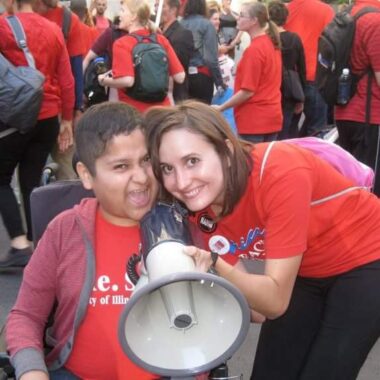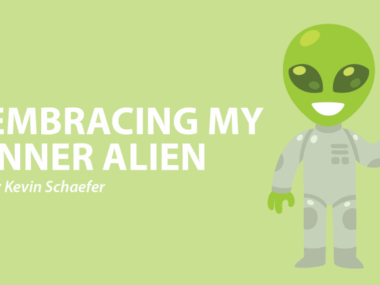Personal care attendants have allowed a life of possibilities
Written by |

Caregiver Brad Hunt accompanied Trevino on a study abroad trip to Rome. (Photo courtesy of Hugo Trevino)
Hugo Trevino is a disability advocate and academic adviser from Chicago. He has spinal muscular atrophy type 3 and helps disabled students find success.
Having a disability means I cannot do things on my own and it sucks because I need to ask for help with almost everything. As a child, I was lucky to attend a summer camp for children with neuromuscular diseases. Attending this camp allowed me to see that I could have independence with the help of counselors.
As an adult, I replaced camp counselors with personal care attendants (PCAs) who, instead of only providing care for me once a year for one week, became year-round caregivers who opened up a world of possibilities.

Trevino’s sibling-caregivers, Maria and Angel Trevino, push him through the Chicago Spring Half Marathon, while raising funds for Muscular Dystrophy Association. (Photo courtesy of Athlinks)
Having caregivers or PCAs can be hard as you have to schedule people to help you get up and dressed for the day, help you use the bathroom (sometimes multiple times a day), and then help you back into bed at night. The hardest part was honestly trying to figure out when I needed to use the bathroom.
People with severe physical disabilities unfortunately live in a world where we need to schedule our bathroom breaks. It took some trial and error, but I quickly learned how to create a schedule where someone comes to help me about three to four times per day.
As a college student, I was privileged to attend a university that granted me the ability to hire other college students. At the peak of my college independence, I was managing 15 PCAs at one time. Post-college I have hired around three to five PCAs at a time to help me be independent. I do not hire PCAs unless I feel we can become friends. Yes, there is a high level of professionalism that needs to be upheld, but PCAs help me with so many intimate and awkward things that if we weren’t friends and able to laugh at all the challenges we go through in this inaccessible world, we would not last long working together.

Caregiver Sarah Chambers and Trevino protest during a fight for the Chicago Teachers Union and better education for Chicago children. (Photo courtesy of Hugo Trevino)
My PCAs grant me so much independence that they have even allowed me to travel the world. Thanks to my PCAs, I have traveled to more than 30 U.S. states and visited more than eight countries. Even after my PCAs stopped working for me, we have become lifelong friends, I have attended their weddings, and we have kept in touch through so many highs and lows that are a part of life’s experience.
As we celebrate Spinal Muscular Atrophy Awareness Month, I am grateful for all the PCAs who have become friends and advocates as I navigate a world with spinal muscular atrophy.
Thanks to all my caregivers, I know I can navigate a world that was not made for people with disabilities. Together we knock down barriers.
In recognition of Spinal Muscular Atrophy Awareness Month in August, the Faces of SMA campaign features a multimedia series with written essays and video interviews highlighting the real-life experiences of people affected by SMA in their own words. Follow us on Facebook and Instagram for more stories like this, using the hashtag #FacesofSMA, and check here for more.



